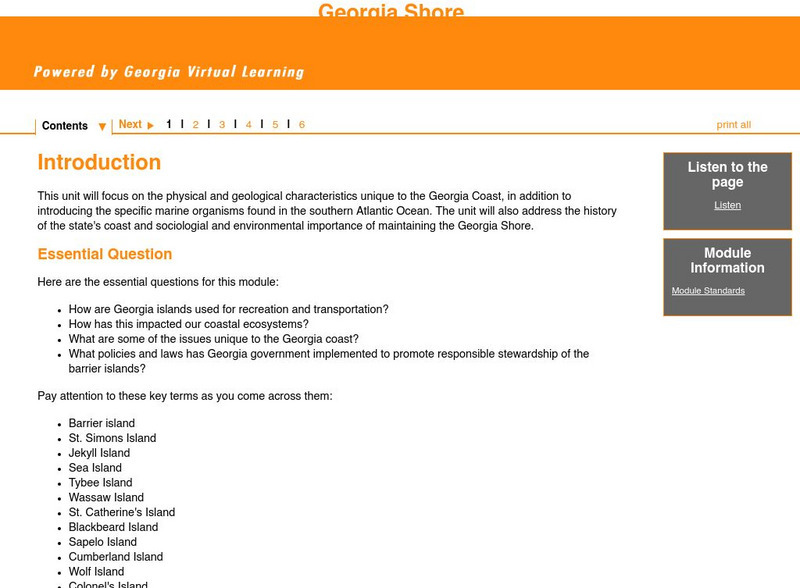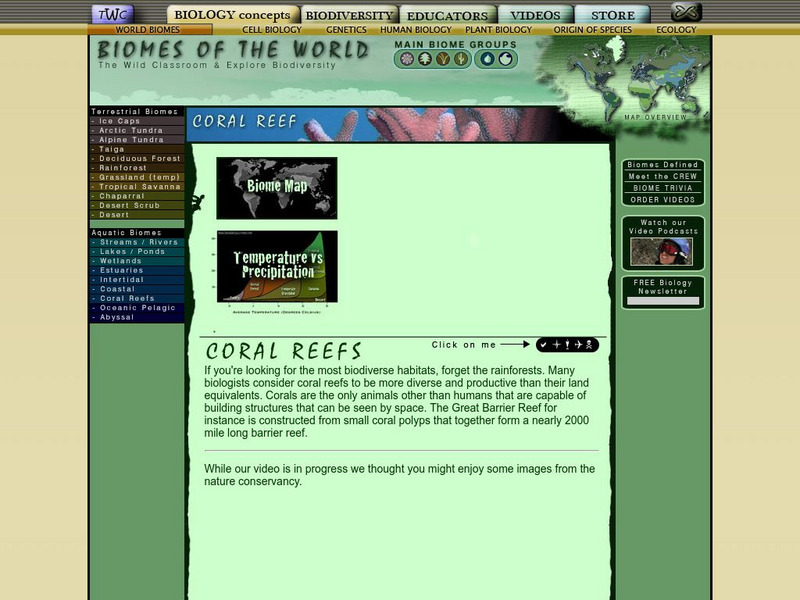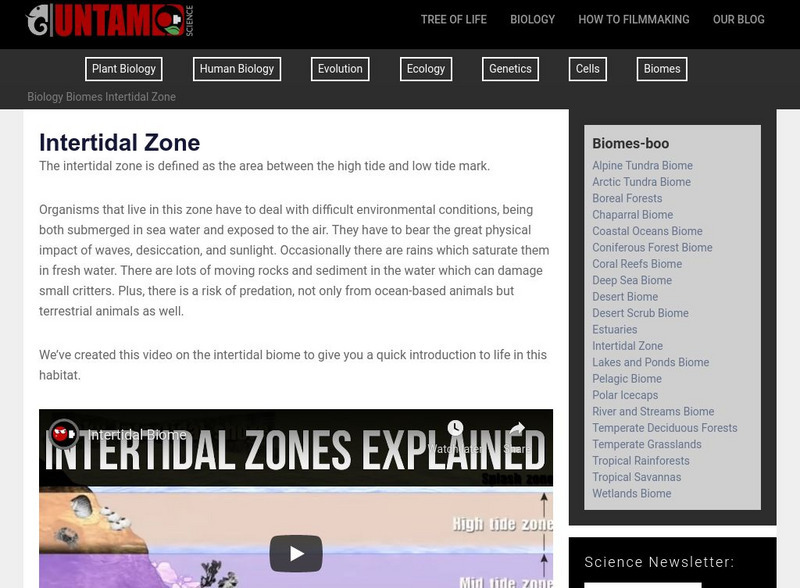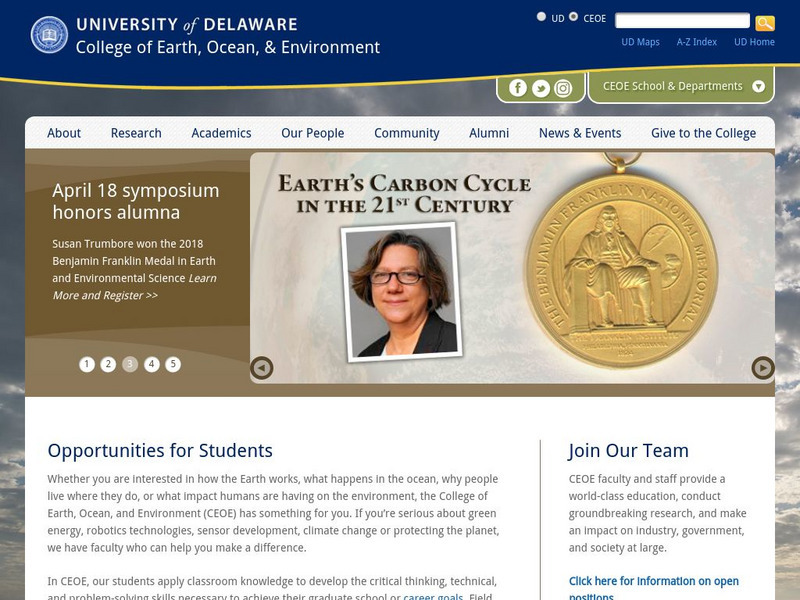Hi, what do you want to do?
Georgia Department of Education
Ga Virtual Learning: Georgia Shore
Find out about the physical and geological characteristics unique to the Georgia Coast, in addition to the specific marine organisms found in the southern Atlantic Ocean. Also learn the history of the state's coast and sociological and...
San Diego State University
San Diego State University: Researching Research
This comprehensive unit site from the San Diego State University is geared towards seventh grade math and science students. "Students will chose a research project currently in progress and research it using traditional techniques, the...
NOAA
Noaa: Ocean Facts on Runoff Pollution
Find out how water pollution can be prevented and how it affects you.
Untamed Science
Untamed Science: Biology: World Biomes: Coastal Oceans Biome
Explore photos, watch video clips, and learn about the aquatic biome located above the continental shelf. [8:37]
Exploratorium
Exploratorium: Webcast: Live Deep Sea Exploration via E/v Nautilus
Oceanographer Dr. Bob Ballard is interviewed in a webcast to highlight the purpose and experiences of his deep sea explorations. Ballard has teams on a ship studying in the Mediterranean Sea and Atlantic Ocean researching hydrothermal...
Other
Dalhousie University: Department of Oceanography
Find out more about Grad studies, classes, seminars in the area of oceanography and also see some amazing pictures.
Untamed Science
Untamed Science: Biology: World Biomes: Pelagic Biome
Learn about the different zones of the open ocean, the pelagic biome, and what organisms call each zone home.
The Wild Classroom
The Wild Classroom: Biomes of the World: Intertidal Zone
Learn about the intertidal ecosystem. Find out about plants, animals, adaptations, and conservation efforts.
Institute of Marine Science
Forsea: If I Can't See It, How Do I Know It's There?
A diagram showing features of the seafloor and a laboratory experiment involving a model of the seafloor highlight this site. This is a good resource for teachers as well.
The Wild Classroom
The Wild Classroom: Biomes of the World: Coral Reef Biome
Learn about the coral reef ecosystem. Find out about plants, animals, adaptations, and conservation efforts.
PBS
Pbs: El Nino
You can link to the anatomy of El Nino, chasing El Nino, and El Nino's reach. There is a resource page and a search page.
World Wildlife Fund for Nature
World Wildlife Federation: Loggerhead Turtle
Read biological facts and conservation information about the endangered Loggerhead Sea Turtle. Find out about the main threats to the turtles and what is being down to help.
Canadian Wildlife Federation
Hinterland Who's Who: Seabirds
Get the facts about seabirds. This group of birds makes up about three percent of the various species, even though two-thirds of the Earth is covered in water. Learn some unique facts and characteristics of seabirds. Also included in...
University of California
Ucmp: The World's Biomes
The University of California Museum of Paleontology hosts this site devoted to the study of the earth's biomes, which are the world's major communities, classified according to the predominant vegetation and adaptations of organisms to...
Untamed Science
Untamed Science: Biology: World Biomes: Intertidal Zone: Aquatic Biome
Learn about the flora and fauna of the intertidal aquatic zone and the characteristics that describe this aquatic biome through reading and watching video clips. [6:42]
Smithsonian Institution
Smithsonian National Zoo
Here is the National Zoological Park right at our fingertips. Students will find many things to explore at this colorful and engaging site. Any study of animals will have a successful start here. Chances are students can catch their...
Scholastic
Scholastic: Study Jams! Science: Earth's Oceans
Oceans contain 97% of the water on the Earth and are home to a huge number of living creatures. View an informative slideshow of the ocean and its inhabitants and then test yourself on what you learned.
The Franklin Institute
In Quiry Almanack: Undersea and Oversee
Dive into a greater understanding of the oceans by tagging along on this exploration of the oceans.
Other
Voyage to the Deep: Vent Crab
Learn about vent crabs in this overview that includes a QuickTime video clip and several photos.
Wonderville Media
Wonderville: Oceanographers
The planet Earth has more ocean than land, so oceanographers have a lot to work with! Whether they study marine biology, tides, engineering, or water quality, there is always more to learn about the ocean and the life within it. While...
Australian Broadcasting Corporation
Australian Broadcasting Corporation: Monsters of the Deep: Tons of Tentacles
Read about octopuses and squids. Learn about their tentacles and other parts of the body.
TED Talks
Ted: Ted Ed: Making Waves: The Power of Concentration Gradients
The constant motion of our oceans represents a vast and complicated system involving many different drivers. Sasha Wright explains the physics behind one of those drivers- the concentration gradient- and illustrates how our oceans are...
TED Talks
Ted: Ted Ed: The Otherworldly Creatures in the Ocean's Deepest Depths
Although the deep ocean zone seems like an inhospitable and remote corner of the planet, it is actually one of the greatest habitats on Earth. Lidia Lins explores how so many species thrive in this mysterious underwater world. [5:02]
NASA
Nasa: Climate Kids: Gallery of Oceans
A collection of images showing Earth's oceans and how they are affected by climate change.

























